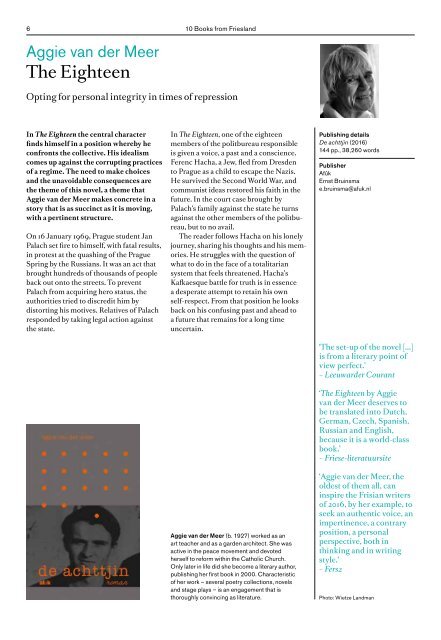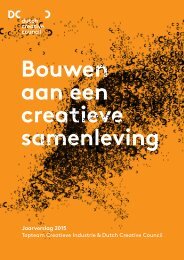10 Books from Friesland
10_books_from_friesland
10_books_from_friesland
You also want an ePaper? Increase the reach of your titles
YUMPU automatically turns print PDFs into web optimized ePapers that Google loves.
6<br />
Aggie van der Meer<br />
The Eighteen<br />
<strong>10</strong> <strong>Books</strong> <strong>from</strong> <strong>Friesland</strong><br />
Opting for personal integrity in times of repression<br />
In The Eighteen the central character<br />
finds himself in a position whereby he<br />
confronts the collective. His idealism<br />
comes up against the corrupting practices<br />
of a regime. The need to make choices<br />
and the unavoidable consequences are<br />
the theme of this novel, a theme that<br />
Aggie van der Meer makes concrete in a<br />
story that is as succinct as it is moving,<br />
with a pertinent structure.<br />
On 16 January 1969, Prague student Jan<br />
Palach set fire to himself, with fatal results,<br />
in protest at the quashing of the Prague<br />
Spring by the Russians. It was an act that<br />
brought hundreds of thousands of people<br />
back out onto the streets. To prevent<br />
Palach <strong>from</strong> acquiring hero status, the<br />
authorities tried to discredit him by<br />
distorting his motives. Relatives of Palach<br />
responded by taking legal action against<br />
the state.<br />
In The Eighteen, one of the eighteen<br />
members of the politbureau responsible<br />
is given a voice, a past and a conscience.<br />
Ferenc Hacha, a Jew, fled <strong>from</strong> Dresden<br />
to Prague as a child to escape the Nazis.<br />
He survived the Second World War, and<br />
communist ideas restored his faith in the<br />
future. In the court case brought by<br />
Palach’s family against the state he turns<br />
against the other members of the politbureau,<br />
but to no avail.<br />
The reader follows Hacha on his lonely<br />
journey, sharing his thoughts and his memories.<br />
He struggles with the question of<br />
what to do in the face of a totalitarian<br />
system that feels threatened. Hacha’s<br />
Kafkaesque battle for truth is in essence<br />
a desperate attempt to retain his own<br />
self-respect. From that position he looks<br />
back on his confusing past and ahead to<br />
a future that remains for a long time<br />
uncertain.<br />
Aggie van der Meer (b. 1927) worked as an<br />
art teacher and as a garden architect. She was<br />
active in the peace movement and devoted<br />
herself to reform within the Catholic Church.<br />
Only later in life did she become a literary author,<br />
publishing her first book in 2000. Characteristic<br />
of her work – several poetry collections, novels<br />
and stage plays – is an engagement that is<br />
thoroughly convincing as literature.<br />
Publishing details<br />
De achttjin (2016)<br />
144 pp., 38,260 words<br />
Publisher<br />
Afûk<br />
Ernst Bruinsma<br />
e.bruinsma@afuk.nl<br />
‘The set-up of the novel [...]<br />
is <strong>from</strong> a literary point of<br />
view perfect.’<br />
– Leeuwarder Courant<br />
‘The Eighteen by Aggie<br />
van der Meer deserves to<br />
be translated into Dutch,<br />
German, Czech, Spanish,<br />
Russian and English,<br />
because it is a world-class<br />
book.’<br />
– Friese-literatuursite<br />
‘Aggie van der Meer, the<br />
oldest of them all, can<br />
inspire the Frisian writers<br />
of 2016, by her example, to<br />
seek an authentic voice, an<br />
impertinence, a contrary<br />
position, a personal<br />
perspective, both in<br />
thinking and in writing<br />
style.’<br />
– Fers2<br />
Photo: Wietze Landman



